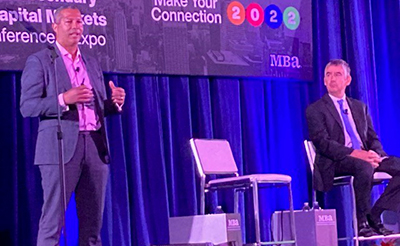
#MBASecondary22: A Volatile Economic Outlook

Seth Carpenter (l) of Morgan Stanley and MBA Chief Economist Mike Fratantoni at the MBA National Secondary and Capital Markets Conference & Expo in New York on May 17.
NEW YORK—The mortgage industry is coming off two of its best years in history, despite a temporary but economically devastating pandemic. Now, economists said here at the MBA National Secondary and Capital Markets Conference & Expo, the industry is entering a more challenging environment.
MBA Chief Economist Mike Fratantoni said the association’s 2022 housing forecast shows the market scaling back, as rising interest rates continue to erode refinance volume.
“Refi volume is well behind a few years ago,” Fratantoni said. “The majority of it is cash-out refinancings—but it is really no longer a refinance market.”
Fratantoni said MBA remains bullish on housing starts and home construction going forward. “We think homebuilders are still dealing with supply chain issues, but the demand is still there,” he said. He noted, however, that existing home sales will continue to fall in 2022 (to 5.93 million) before recovering slightly to 6.06 million in 2023.
The MBA Purchase Application Payment Index shows affordability is problematic, with home prices outstripping consumer income. “It’s creating a dilemma for potential home buyers, who are weighing Door Number One—whether to take on the added costs of homeownership—or Door Number Two—to continue renting in a market where rents are also going up aggressively.”
“Housing affordability is clearly worse than it has been in many decades,” said Seth Carpenter, Managing Director and Chief Global Economist with Morgan Stanley, New York. “A key part of our forecast is a sharp decrease in housing activity. Monetary policy always—always—has an effect on housing. The Fed’s decision to reduce its holdings of mortgage-backed securities will have effects on the housing market.”
MBA has also noted an increase in adjustable-rate mortgages—now nearly 11 percent of the market. “The ARM market is entirely different now,” he said. “These are standard ARM products that are based on post-Dodd-Frank, post-Great Recession reforms.”
And preliminary data from an upcoming MBA Loan Performance Report shows margins continue to compress, with just 5 basis points in profit projected for the first quarter. “We’re at an all-time high for originating costs,” Fratantoni said. “A lot of lenders are starting to right-size their operations and cut costs wherever they can.”
Cost to service loans also show increases. “As servicers help consumer exiting forbearance, servicing costs are increasing, and we expect them to continue to increase,” Fratantoni said.
Carpenter said the economy continues to show signs of decelerating. “The U.S. economy is going to grow at about half the rate this year it did in past years,” he said. “The other thing to keep in mind is that growth is being heavily influenced by regrowth in inventories. If we get the deceleration in home sales that we are expecting, then it could also result in a drop in durable goods purchases, which could further decelerate the economy.”
The issue right now, Carpenter said—echoed by New York Fed President & CEO John Williams earlier at the Conference—is that there is too much demand for services that are not available. “Demand has to come back to normal levels,” he said.
Despite this volatility, Carpenter said, a recession is not likely to happen. “The market is not the economy, and the economy is not the market,” he said. “Fed Chairman [Jerome] Powell says he wants the Fed to be nimble in its approach. He wants to curb inflation and he wants to manage employment; and if the markets overreact, he wants to be nimble enough to adjust. I don’t know that we’ll have a soft landing; it will likely be more of a bumpy landing. But I think it will have the effect of avoiding a recession.”
The Fed’s focus—rightly, Carpenter said—is on inflation. “Inflation is too high, which is why we are seeing the Fed aggressively raise interest rates,” he said. “It looks like we are not going to get back to the pre-COVID trend line, but what the Fed can do is rein in demand to tighten the economy.
Carpenter said he expects inflation to slow in coming quarters. And he expects the Federal Open Market Committee to continue to aggressively raise interest rates over the next year, to around 3.75 percent by the end of next year.
“Housing affordability is clearly worse than it has been in many decades,” he said. “A key part of our forecast is a sharp decrease in housing activity. Monetary policy always—always—has an effect on housing. The Fed’s decision to reduce its holdings of mortgage-backed securities will have effects on the housing market.”
